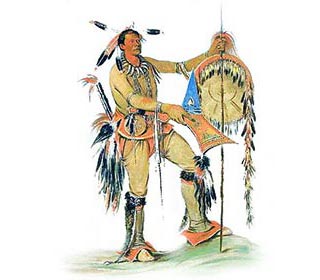The names of the Illinois tribes included the Illinois tribe (Illini), Iroquois, Chippewa, Ottawa, and Potawatomi, Kickapoo, Kaskaskia, Miami, Shawnee, Sauk and Fox tribes. The Illinois Confederacy
The Illinois confederacy of Algonquian tribes who inhabited parts of Wisconsin, consisted of a group of six united tribes called the Illinois, Iowa and Missouri, Cahokia, Kaskaskia, Michigamea, Moingwena, Peoria, and Tamaroa. They were all part of the Algonquian family. The word 'Illini' meant "superior men." The enemies of the Illinois Confederacy were the the illinois were almost constantly harassed by the Sioux, Fox, and other northern tribes. Fast Facts about the History of Illinois Indians
The climate, land, history, environment and natural resources that were available to the indigenous Indian tribes in Illinois resulted in the adoption of the Northeast Woodlands culture - Name of State: Illinois
- Meaning of State name: Meaning “Men or warriors,” the name of a confederacy of Algonquian tribes.
- Geography, Environment and Characteristics of the State of Illinois: Prairies and fertile plains throughout; open hills in the southern region
- Culture adopted by Illinois Indians: Northeast Woodlands Cultural Group
- Languages: Iroquoian and Algonquian
- Way of Life (Lifestyle): Hunter-gatherers, farmers, fishers, trappers
- Types of housing, homes or shelters: Chickees, Wigwams (aka Birchbark houses) and Longhouses
History Timeline of the Illinois Indians - 10,000 B.C. : Paleo-Indian Era (Stone Age culture) the earliest human inhabitants of America who lived in caves and were Nomadic large-game hunters of animals including the Great Mammoth
- 7500 BC: Eastern Woodland Culture of Fisher Hunters begins. Permanent houses and farming
- 7000 BC: Archaic Period in which people built basic shelters and made stone weapons and stone tools
- 1700 BC: Mound Builders culture, a feature of many Woodland tribes
- 1000: Mississippian Culture established. This was the last of the mound-building cultures of North America in Midwestern, Eastern, and Southeastern United States
- 1673: Jacques Marquette (1637-1675) and Louis Joliet (1645-1700) explore Illinois
- 1680: René Robert Cavelier, Sieur de La Salle (1643-1687) and Henry de Tonty (1650-1704) build Fort Crèvecoeur
- 1680: The Iroquois entered the region to attack the Illinois Confederacy tribes. Many were killed in the conflict.
- 1712: The First French Fox War (1712–1716) began when Fox, Kickapoo, and Mascouten attacked Fort Pontchartrain
- 1728: The Second Fox War (1728–1733), the Fox were reduced to 500 by French troops and Indian allies. The Fox tribe join the Sauk Tribe after defeat
- 1754: 1754 - 1763: The French Indian War is won by Great Britain against the French so ending the series of conflicts known as the French and Indian Wars
- 1763: Treaty of Paris
- 1764: Pontiac's Rebellion broke out in the Ohio River Valley. The Ottawa Chief Pontiac (1720-1769) to lead a rebellion of a number of tribes against the British
- 1775: 1775 - 1783 - The American Revolution.
- 1776: July 4, 1776 - United States Declaration of Independence
- 1800's: Conflict erupts between settlers and Native Indians including the Illinois, Iroquois, Chippewa, Ottawa, and Potawatomi, Kickapoo, Kaskaskia, Miami, Shawnee, Sauk and Fox tribes throughout the 1800's
- 1803: Kaskaskia Indians cede nearly all of their lands
- 1803: The United States bought the Louisiana Territory from France for 15 million dollars for the land
- 1812: 1812 - 1815: The War of 1812 between U.S. and Great Britain, ended in a stalemate but confirmed America's Independence
- 1812: Potawatomi Indians massacre at Fort Dearborn
- 1813: Peoria War was a battle between the U. S. Army, settlers and the Native American tribes of the Potawatomi and the Kickapoo tribes in the Peoria area of Illinois. Their villages were attacked and the tribes left the area. Battles and conflicts resumed in the Winnebago War of 1827 and the Black Hawk War of 1832 - see Black Hawk.
- 1827: Winnebago War (Fever River expedition) against the Winnebago Indians in Illinois
- 1829: Chippewa, Ottawa, and Potawatomi cede lands
- 1830: Indian Removal Act
- 1832: Black Hawk War occurred in Northern Illinois, Michigan, Southwestern Wisconsin including the Battle of Bad Axe
- 1832: Department of Indian Affairs established
- 1839: Cherokee Indians pass through Illinois on the "Trail of Tears" to Oklahoma
- 1861: 1861 - 1865: The American Civil War.
- 1862: U.S. Congress passes Homestead Act opening the Great Plains to settlers
- 1865: The surrender of Robert E. Lee on April 9 1865 signalled the end of the Confederacy
- 1887: Dawes General Allotment Act passed by Congress leads to the break up of the large Indian Reservations and the sale of Indian lands to white settlers
- 1885: The consolidated Peoria, Kaskaskia, Wea, and Piankashaw numbered only 149
- 1969: All Indians declared citizens of U.S.
- 1979: American Indian Religious Freedom Act was passed
History of Illinois Indians - Destruction and Decline
The history of the European invasion brought epidemic diseases such as tuberculosis, cholera, influenza, measles and smallpox. The Native Indians of Illinois had not developed immunities against these diseases resulting in huge losses in population. Exploitation including the leverage of taxes, enforced labor and enslavement were part of their history, taking their toll on the Illinois Indians. |
